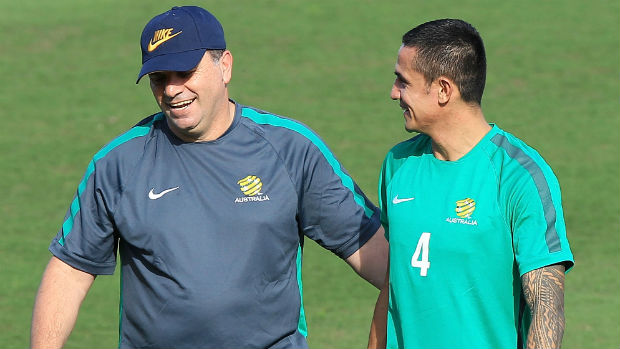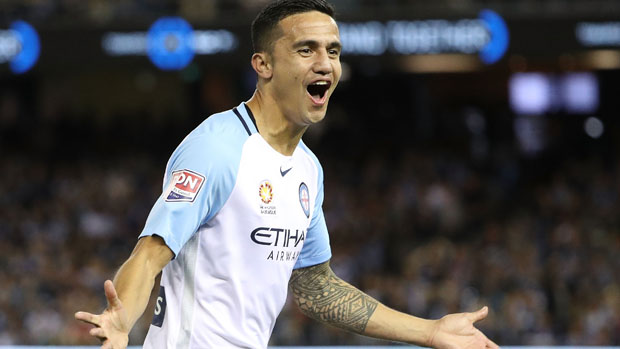Tim Cahill can do anything. That we know. But where will this Australian sporting icon be in another ten years? As the Hyundai A-League marquee tells Aidan Ormond, he’s already planning ahead.
In part one Tim Cahill explained what young players need to do, to make it in professional football.
VIDEO: Cahill nets absolute stunner on A-League debut
Melbourne Derby analysis: Cahill lives up to the hype
Hyundai A-League Team of the Week: RD 2
Now the Melbourne City superstar tells www.a-league.com.au managing editor Aidan Ormond his own motivations, his mentors and plans for the future.

Tim, when you get up in the morning, what motivates and challenges you?
I’ve always been someone that thinks outside the box.
If someone says ‘don’t jump’, I’ll jump.
I’ve played in four continents and to be part of the City Football Group’s ethos is important. I wake up because I have a plan. I know where I’m going to be in my head in four, five, six years.
I said it before I left the Premier League to go on a two-and-a-half year deal in the MLS, I said it when I left the MLS to go play in China, and I said it when I left to go from China to Australia.
Now, the clear point for me is I know when I get up I’m going to have a great training run, I’m part of the City Group and I know their dreams and aspirations of what they want to do with the club in Australia, and they are making me a part of that.

How special does that make me feel to know that the third year and the next two years in that as a player, I’m learning about coaching, I’m doing my badges, I’m taking courses outside for business?
If I don’t want to be a coach in the third year, maybe I’ll go work in commercial, maybe I want to be learning what a CEO does?
Tell me more…
The third year of my contract is employment, coaching with the CFG.
I speak with Patrick Vieira; mould myself into what he’s doing with Brian Marwood and Khaldoon Al Mubarak [CFG Chairman] who I met in Abu Dhabi.
There’s a clear affinity and culture and authenticity that they want to bring to Melbourne. That is a powerful thing. The FFA understands what it means to have the City Football Group in the league.

What about your mentors?
One of my strongest mentors is David Moyes [former Everton manager]. Someone who texted me the other day asking how are things.
Robbie Thomson, CEO of News Corp. People not involved in football as much. You can even go as far to say CEOs of big companies [and] Patrick Delany [Fox Sports] and [broadcaster] Alan Jones … just to ask advice.
I just want to understand what’s relevant and what’s important.
What I’ve done the last six weeks is learn about the AFL. I want to know why we aren’t learning about the AFL. I want to know why 85,000 people go to a game. I want to know how 100,000 people fill the MCG [on grand final day]. I want to know how they do it.
Like how I learned about the MLS and commercial, image rights, marketing, business, how they buy clubs and build property.
If I had to write a case study about Premier League, MLS and also China I could. Because I got to sit with [MLS Commissioner and US football visionary] Don Garber and talk about what’s important in football, what’s his vision for the MLS.

You look now; it’s just amazing that aligning instead of competing is a lot stronger than trying to be competitive, because I don’t compete against the players that I play with.
There’s no value in me competing with Socceroos players, there’s no value competing with Melbourne City players, the value comes when you make each other stronger.
We’re the biggest code in the world but in Australia we’re not.
You have to accept the reality of staying inside your own mind and learning, working and trying to work out how we build it stronger. Instead of just going at a plateau, just getting by every year, there has to be certain elements that we have to judge ourselves by.
Are there certain traits of successful people?
You have to understand their backgrounds. You do a bit of history on their backgrounds and they started with nothing. And that is the reason they are so hungry, that’s what keeps them going.
The key question you have to ask yourself is why shouldn’t you work harder now than what you did before, just because you’ve got more.

Why should you just accept average and why, because you’re Australian, just say ‘it’s alright, let’s just go and play for the sake of it’.
It’s not about that. If you want to be competitive you actually have to test yourself consecutively and give as much as you can.
Some people retire, and I’ve seen it, they didn’t want it. Maybe they were fearful of what failure can be.
That’s why I’m at peace with the game. I’m at peace with contributing and when my time’s up I’ll go out gracefully.
I look at Kevin Muscat and Johnny Aloisi now and they are still in great shape. They still look good, take pride in their appearance, their players and teams reflect their ethos, which is what I’m learning about with the A-League, which is awesome.
I first interviewed you ten years ago. If I interview you in another 10 years, which Tim Cahill will it be? A corporate high flyer or someone involved in football?
Football, in a big way.
Someone that’s very influential in football. I think working with the City Football Group. I have a clear vision of who I like partnering with and how I like to build the game.

I feel a group like that coming and investing in our country is a compliment. They are one of the strongest brands in the game and they are in Australia, that’s all I care about.





